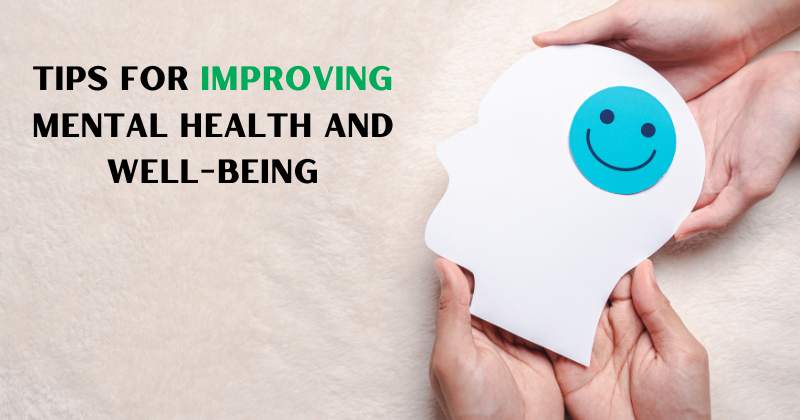Maintaining good mental health is essential for living a happy and fulfilling life. It is not only about the absence of mental illness, but also about taking proactive steps to promote overall well-being. There are various ways to improve mental health, such as practicing mindfulness, staying active, connecting with others, and seeking professional help when needed. In this article, we will discuss some practical tips for improving mental health and well-being, which can be incorporated into daily life to promote a positive mindset and healthy emotional state.
Here are some tips for improving mental health and well-being:

Practice Mindfulness
Mindfulness is the practice of being present in the moment, paying attention to our thoughts and feelings without judgement. It’s an effective way to reduce stress, anxiety, and depression. Start by taking a few minutes each day to sit quietly and focus on your breath. Over time, you can incorporate mindfulness into your daily routine, such as during a walk, while eating, or while doing a task.
Exercise Regularly
Regular exercise is not only beneficial for physical health but also for mental health. It helps to reduce stress, anxiety, and depression, and can improve mood and self-esteem. Aim for at least 30 minutes of physical activity each day, such as jogging, walking, cycling, or swimming.
Get Enough Sleep
Getting enough sleep is essential for mental and physical health. Sleep deprivation can lead to irritability, fatigue, and difficulty concentrating. Aim for seven to eight hours of sleep each night and establish a consistent sleep routine.
Eat a Balanced Diet

Eating a balanced diet is important for overall health, including mental health. Consuming a variety of fruits, vegetables, whole grains, lean protein, and healthy fats can provide the necessary nutrients for the body and mind. Avoid processed foods, sugary drinks, and excessive alcohol consumption.
Connect with Others
Social connections are important for mental health and well-being. Maintaining positive relationships with family, friends, and colleagues can provide support, reduce stress, and improve mood. Join a club, take a class, or volunteer in the community to meet new people and connect with others who share similar interests.
Practice Gratitude
Practicing gratitude is an effective way to improve mental health and well-being. Take a few moments each day to reflect on the things you are thankful for in your life. This can be as simple as appreciating a beautiful sunset, a good cup of coffee, or spending time with loved ones.
Set Realistic Goals
Setting realistic goals can provide a sense of purpose and accomplishment, which can improve self-esteem and well-being. Start with small goals and work your way up to larger ones. Celebrate your achievements and learn from any setbacks.
Also Read: Peace of Mind: Top Mental Health Apps for Managing Stress and Anxiety
Learn New Skills

Learning new skills can provide a sense of accomplishment and improve mental health and well-being. Take a class, learn a new language, or pick up a new hobby. Learning something new can also provide a sense of purpose and fulfilment.
Practice Self-Care
Self-care is essential for mental health and well-being. Take time each day to do something you enjoy, such as reading a book, taking a bubble bath, or going for a walk. This can help reduce stress and improve mood.
Seek Professional Help
If you are struggling with mental health issues, seek professional help. A mental health professional can provide support, guidance, and treatment to help you manage your symptoms and improve your quality of life.
In conclusion, mental health and well-being are essential components of overall health. By practicing mindfulness, exercising regularly, getting enough sleep, eating a balanced diet, connecting with others, practicing gratitude, setting realistic goals, learning new skills, practicing self-care, and seeking professional help when needed, you can improve your mental health and well-being. Remember, small changes can make a big difference, so start today and prioritise your mental health.


